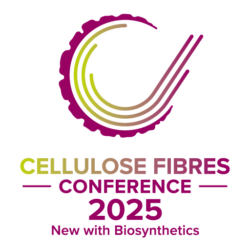Innovation award “Cellulose Fibre Innovation of the Year 2025”
The winners!
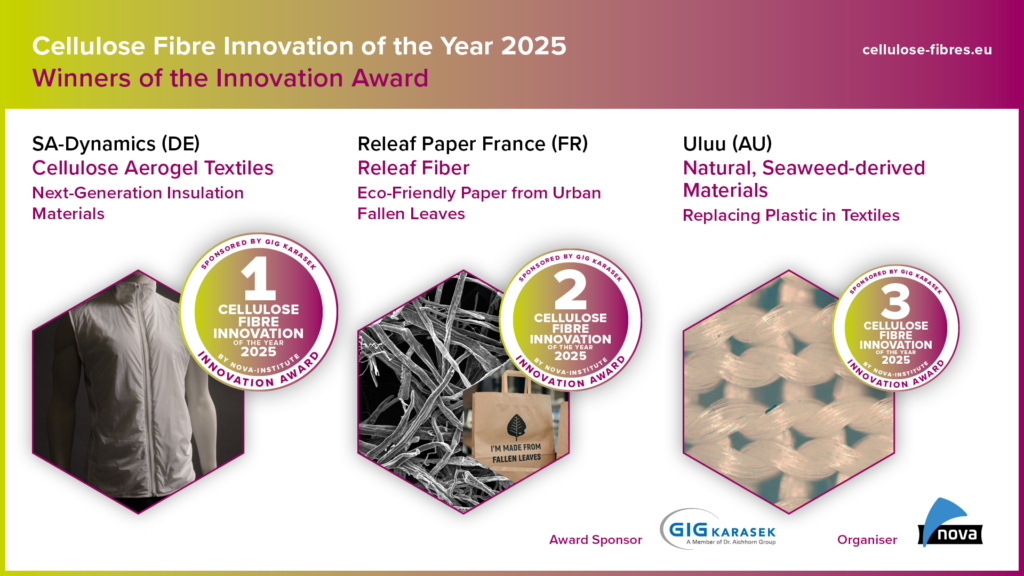
The nominees
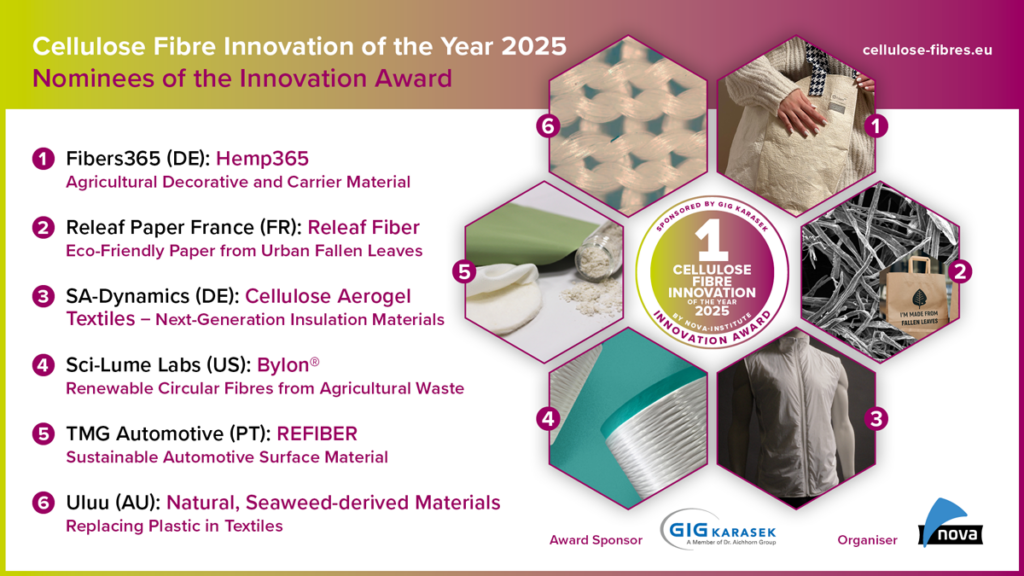
Fibers365 (DE): Hemp365 – Agricultural Decorative and Carrier Material
The solution “hemp365” is characterised by the development of a cost-effective, plant-based decorative and carrier material through the chemical-free processing of a regional agricultural fibre and the use of resulting short fibres in a wet-laid process, allowing for a massive reduction in the amount of fossil based binders required for strength and functionality. The non fibre content is less than 7 % and is also made from biogenic and biodegradable material. Hemp365 is 100 % natural and vegan. It has been designed for consumer (fashion) and industrial applications in cooperation with an automotive OEM. fibers365.com
Releaf Paper France (FR): Releaf Fiber – Eco-Friendly Paper from Urban Fallen Leaves
Releaf Paper France transforms urban fallen leaves into sustainable cellulose fibres, offering an eco-friendly alternative to traditional hardwood pulp. Using proprietary low-temperature extraction, high-quality fibres with excellent paper-forming properties are isolated. With a cellulose content of 32-48 % and properties similar to hardwood, RELEAF fibres are ideal for packaging materials like corrugated paper, boxes, and bags. This innovative process, which requires minimal water and non-aggressive solvents, aligns with circular economy principles, repurposing millions of tons of urban leaf waste annually and supporting global brands in achieving sustainable packaging solutions. releaf-paper.com
SA-Dynamics (DE): Cellulose Aerogel Textiles – Next-Generation Insulation Materials
Cellulose Aerogel Textiles are revolutionary insulation materials made from 100 % biodegradable cellulose aerogel fibres. These combine the flexibility and ease of processing of traditional fabrics with the superior thermal insulation properties of aerogels by utilising a novel aerogel fibre process. Lightweight, highly efficient, and compatible with conventional textile machinery, they provide a sustainable alternative to fossil-based and animal-derived insulation materials. Fully recyclable and free from microplastic emissions, Cellulose Aerogel Textiles set a new benchmark for circular economy solutions in the textile and construction industries. Initial functional demonstrators were developed through two projects, funded by Biotexfuture and RWTH Innovation, respectively. sa-dynamics.com
Sci-Lume Labs (US): Bylon® – Renewable Circular Fibres from Agricultural Waste
Sci-Lume Labs makes Bylon®, a scalable, circular, biosynthetic fibre. Using highly efficient chemistries to valorise agricultural waste, Bylon® seamlessly integrates into every step of the global value chain – from raw material production through textile manufacturing. Bylon® is distinct from incumbent and next-gen materials because it is simultaneously bio-based; waste-derived; degradable; recyclable; downstream-compatible; and melt-spinnable. Bylon® also offers a unique performance profile by combining the mechanical properties and tunability of traditional synthetics with the moisture properties and circularity of natural fibres. By not requiring changes to the supply chain, Bylon® empowers the industry to reduce its environmental impact – without compromising on quality, performance, or cost. sci-lumelabs.com
TMG Automotive (PT): REFIBER – Sustainable Automotive Surface Material
Textile-based composite solutions are a growing trend in the automotive sector, especially for decorative and functional interior applications. Innovative plant-based leather demonstrates this trend, combining sustainability with advanced performance. Developed from a biopolymer matrix combined with cellulose waste, this material transforms waste into a premium, eco-friendly solution. Its textile backing and non-woven laminate backing are also made entirely from cellulose fibres, creating a fully integrated bio-based composite. Designed for car interiors and more, this lightweight, durable and aesthetically versatile material sets a new standard for sustainable design, while satisfying the industry’s growing demand for circular and renewable alternatives. tmgautomotive.pt
Uluu (AU): Replacing plastic in textiles with natural, seaweed-derived materials
Uluu is an Australian start-up set to replace plastics with natural polymers called PHAs. Uluu materials are made from a regenerative feedstock: farmed seaweed, thus ending reliance on fossil fuels and land crops. Uluu, in partnership with Deakin University, is developing textiles that perform like synthetic polyester but are truly biodegradable and biocompatible, thus eliminating persistent microplastic pollution in fashion. Importantly, Uluu materials are reusable, recyclable, and most importantly, compostable. They are naturally produced through a unique fermentation process that uses seaweed, saltwater microbes and seawater. Uluu pellets can be directly substituted for plastic (e.g., polyester, nylon) in existing melt spinning equipment, creating yarns that can be knitted or woven into textiles. In addition to fibre-grade pellets, Uluu is also producing other grades of pellets to replace plastics used in e.g., buttons, sunglasses, hair clips and packaging. uluu.com.au
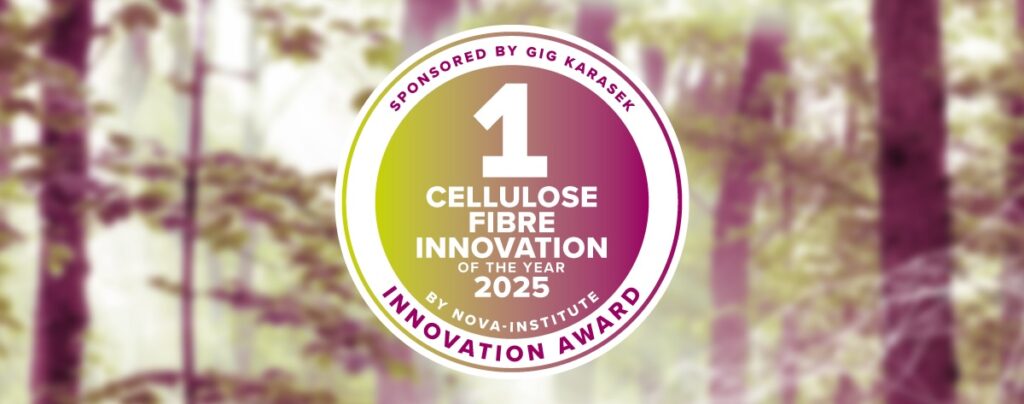
Procedure
Both cellulose fibres and biosynthetics offer promising ways to create a circular economy in the textile industry. This year, for the first time, we are also offering the opportunity to recognise innovation in the field of biosynthetics with the ‘Cellulose Fibre Innovation of the Year 2025’ award.
First stage: until 30 November 2024
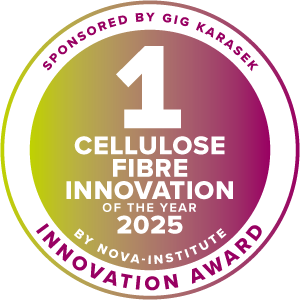
Producers and inventors of innovative technologies and applications are invited to hand in a completed application form (submission form is already closed) and a leaflet or a two-page PDF about the product in English. Please provide us with at least two images in print quality (300 dpi) that we may use for promotional purposes (e.g. on the website, in press communications, in the conference journal or in mailings). Please be sure to include metadata for each image. Metadata must include at least:
Short description, copyright holder, owner of the rights of use and licence note.
The documents should explain the particular aspects of the innovation and when it was launched on the market. It is also necessary to submit a sample of the product (or a small material sample if the product is too unhandy).
Delivery address and email contact: nova-Institut GmbH, Asta Partanen, Leyboldstr. 16 / 2. OG, 50354 Huerth, Germany
Closing date for products or material samples: End of January 2025
Second stage: Mid of December 2024
A jury consisting of representatives of the nova-Institute, the advisory board and sponsors of the conference will nominate the outstanding “Top 6” applicants prior to the conference.
After the jury has selected the “Top 6” candidates among the applicants, their application documents will be made available for download at the conference website to provide our audience and other interested parties a first glimpse of these innovations.
Third stage: At the conference (13 March 2025)
In a short 10-minute presentation, each of the six companies will introduce their innovation on the first day of the conference (13 March 2025). The Cellulose Fibre Innovation of the Year 2025 Award will be voted for by conference delegates as well as online participants on the afternoon of 13 March at 18:00 (CET). Afterwards, the announcement of the winner will take place. The evening gala dinner at the conference venue offers excellent networking opportunities.
In addition, the “Top 6” will present their innovations in a shared exhibition space provided by the nova-Institute during the whole of the conference. Furthermore, there is the option to book your own exhibition space.
All winners and their innovations will be highlighted in the subsequent media coverage. Each “Top 6” candidate will get one free 2-day ticket and further tickets at a discount rate.
Download: Overview of the past innovation award winners (PDF).
